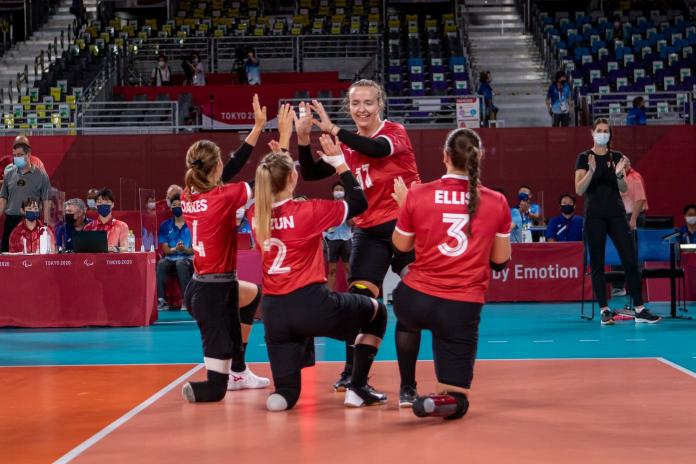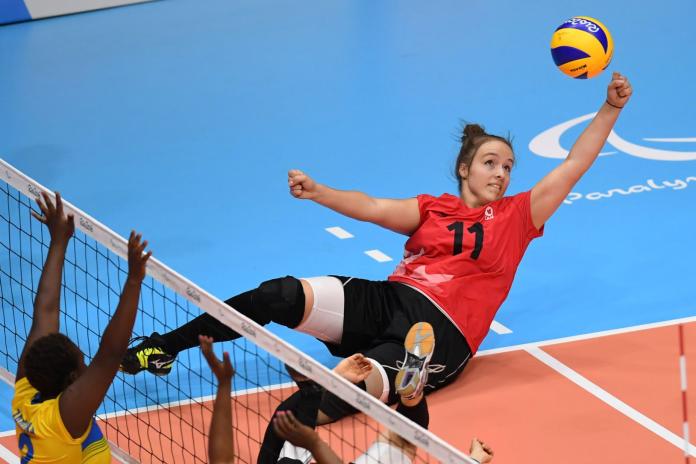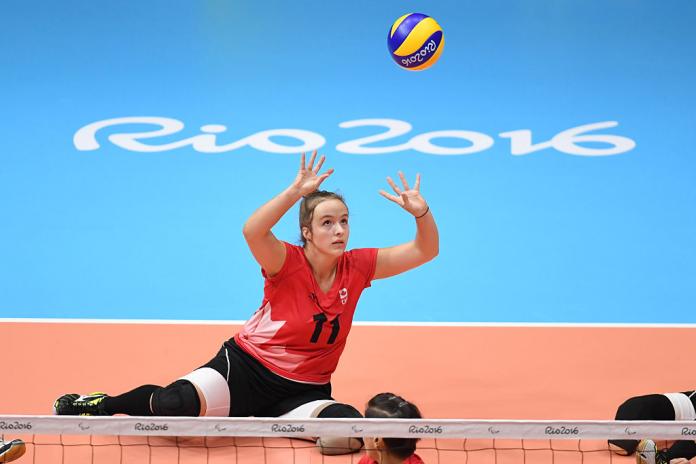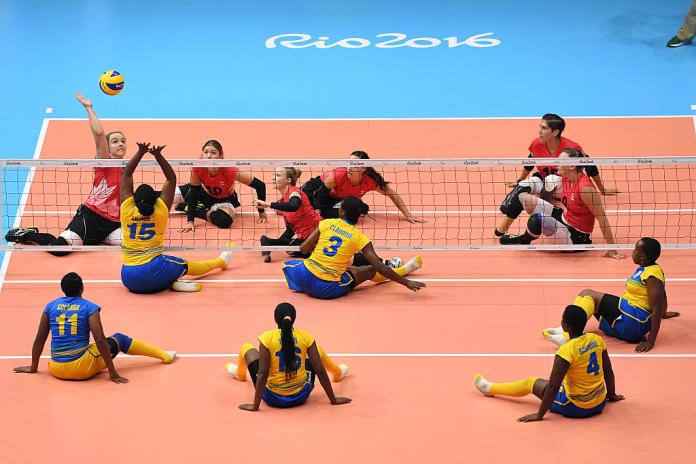After finishing seventh at the 2016 Rio Games and winning a bronze medal at the 2020 Tokyo Games, Canadian sitting volleyball star Heidi Peters and her team are on track to reach the podium at the 2024 Paris Paralympic Games.
But for the attacker from Neillandia, Alberta, sitting volleyball means more than chasing medals.
“Volleyball has always been where I feel most like myself, where I'm happiest and where I feel most fulfilled,” she said.
“When I could no longer play the sport I loved, I felt a hole in my heart. That's when I discovered sitting volleyball. Sitting volleyball gave me confidence, dreams, and a second family.”
Family on court
Peters, who grew up playing stand-up volleyball, was diagnosed with osteosarcoma in her left leg when she was in high school. Chemotherapy did not cure the cancer, and Peters underwent surgery to amputate her leg below the knee.
“I thought I'd never be able to play volleyball again,” said Peters, who was introduced to sitting volleyball by teammate Jolan Wong, who volunteered at Edmonton Children's Hospital where Peters was recovering. The two have played together in the past two Paralympic Games.
“Sitting volleyball has brought a light into my life that I never knew I needed. I have grown and accomplished more than I ever thought possible. My team is my family and it's a connection I will carry with me forever,” Peters said.
The biggest challenge in transitioning to a new sport was movement.
“Moving around on the ground was a whole new skill I had to learn,” Peters said.
But she quickly adapted and was selected for the Canadian sitting volleyball team a year after meeting Wong at the hospital.
A day in the life of a Paralympic athlete
Eight years after making her Paralympic debut at the Rio 2016 Games, Peters is now training hard for her third Paralympic Games, citing “a pure love of the sport and great coaching” as the key to her success.
Peters, an undergraduate political science student, describes herself as a bit of a “night owl.” On average, her day starts at 9 a.m.
“Fortunately, right now I have classes that go until late and only one day of morning practice,” she said, adding that “that will change heading into the summer.”
The first thing she does after breakfast is 30 minutes of stretching, range of motion exercises and physical therapy, then she does a couple of hours of schoolwork before hitting the gym for 60 to 90 minutes.
Heidi Peters and the women's sitting volleyball team are heading to Cairo, Egypt to compete in the World Cup and hopefully earn a ticket to the championship. #Paris2024! 🏐Learn more about Heidi and the team. Let's go to Canada! 🇨🇦 https://t.co/0jrF2YoeDz Follow pic.twitter.com/okVD3jmnPo
— Canadian Paralympic Team (@CDNParalympics) November 9, 2023
She goes home to have lunch, then does some more studying before heading out with her team for two hours of sit-down volleyball practice.
Afterwards, she goes home, has dinner, and usually ends her day by watching an interesting TV show before going to bed.
During the summer, when school is not in session, training days will be similar, but instead of schoolwork, they will be creating content for team and personal social media accounts and working on a new podcast.
Peters has a degree in photography technology from Northern Alberta Institute of Technology and a degree in travel studies from MacEwan University, two fields she loves so much she doesn't mind combining them. She works in travel agency and loves helping people with their travel arrangements. But when she's out at training camp, her focus is on volleyball.
“My schedule during training camps and intensive training periods will be the same as above, but will include two practices, one in the morning and one in the evening, as well as a shorter workout in the afternoon or first thing in the morning, about 30-40 minutes,” Peters said.
Training for Paris 2024
Her main goal this year is to improve on her performance at Tokyo 2020, where Canada lost 3-1 to Brazil in the bronze medal match.
“So, my goal is to win a medal at the Paris 2024 Paralympic Games,” Peters said. “My teammates and I want to show the world how much we've improved. I know we're getting better every time we play and I can't wait to put it all together and show the world on the biggest stage.”
To achieve this, Peters said the team needs to be “moment-to-moment focused over the next few months.” Besides her morning mobility routine, she also does conditioning training three days a week (two days off the court and one day on the court) and weight training three days a week.
“It's important to trust the process, keep the end goal in mind and stay focused on the present,” she said.
“That means now I will focus on training, improving my individual goals which will help me achieve the team's objectives and staying connected as a team. It means working hard in everything I do and putting Paris at the heart of every decision I make in the coming months.”
Personally, Peters is working on improving the pace and accuracy of her serve.
“I work on this by serving against different types of blocks, using a radar gun to track my speed and practicing the need to serve under pressure in different situations in practice and drills,” she said.
Have you ever been interviewed by Bieber? Heidi Peters is interviewed and talks to Coda about sitting volleyball! Watch the 2023 Paravolleyball Pan American Zone Championships. Follow. Follow pic.twitter.com/WnDANJXyxB
— Canadian Paralympic Team (@CDNParalympics) May 11, 2023
She's also been working on becoming a better, more efficient attacker, “which I do by hitting different types of blocks in every position, working closely with my setter to improve the accuracy of my sets, and doing those awkward drills where I have to score to be successful,” she said.
“You can never recreate the pressure, atmosphere and feeling of a Paralympic match in a training environment, but you can practice performing in uncomfortable situations, and that's what I do.”
Besides Peters, three of his Canada teammates and three national team coaches live in Edmonton, and Peters trains with them three to five days a week.
“We don't have a club, we just have regional and national team training. We're fortunate to be able to train regionally with the national team coach,” Peters said.
To relax, I like to cook delicious meals, garden, take photos and spend time with friends and family.
“My core group is a few close friends and my team. Having a support system is super important, as is balancing my personal life, work and athletic life,” she said.
“This balance helps my mental health and keeps me feeling stable and balanced. My parents don't live in the same city as me, but they live close enough that I see them often. They are supportive of my sporting endeavors, and my mom will cook me a meal if I ask, even when she's busy.”
With less than 100 days until the Paris 2024 Paralympic Games, Peters is aiming to help Canada win its first medal since women's sitting volleyball was introduced to the Paralympics two decades ago.
“I love this sport with all my heart,” Peters said. “This passion, combined with coaches who see limitless potential in me, has instilled in me the hard work, discipline and desire to be the best I can be.”
Visit the Paris 2024 ticket sales website to book your Paralympic tickets.





